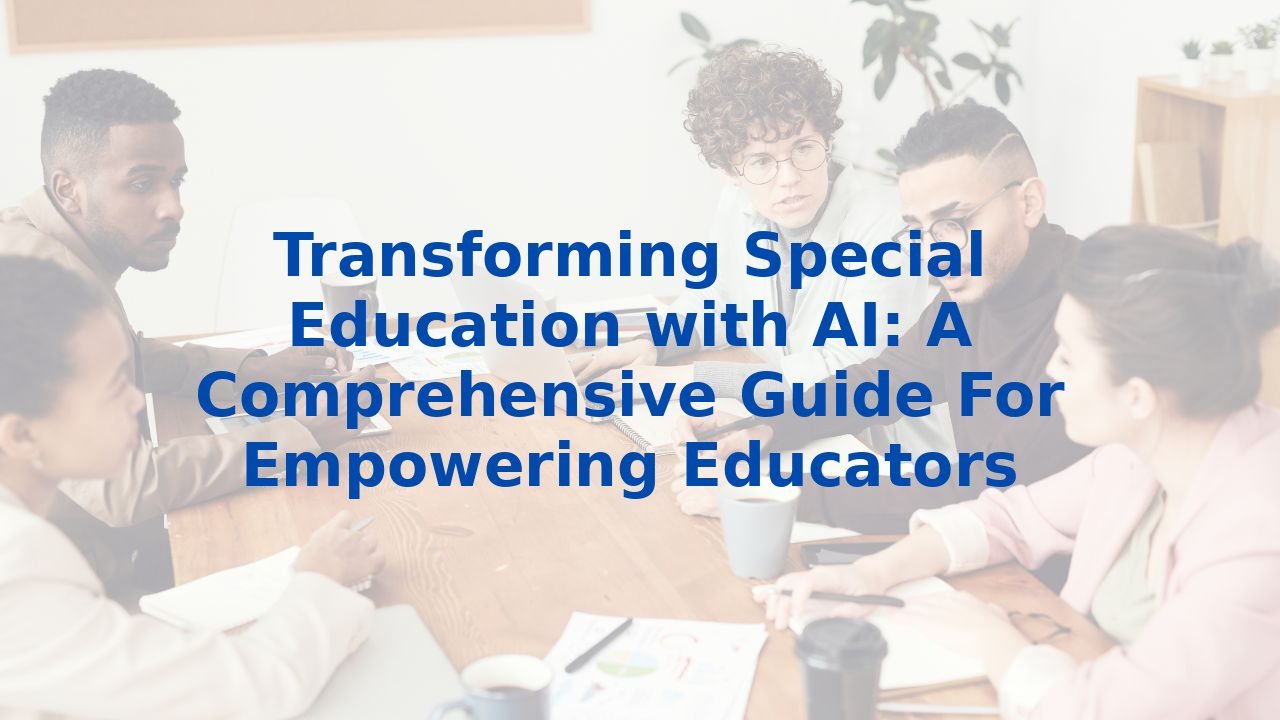Transforming Special Education with AI: A Comprehensive Guide For Empowering Educators
Transforming Special Education with AI: Empowering Educators for Smarter Support
In a world where technology shapes every aspect of our lives, the integration of Artificial Intelligence (AI) in special education is not merely an option—it's a necessity. This advancement isn’t about replacing educators; it's about empowering them to unlock a new level of efficiency and effectiveness in their teaching practices. Through the intelligent use of AI, educational institutions can foster more inclusive, data-driven, and impactful learning environments. This comprehensive guide explores how AI can fundamentally transform special education, enhancing business processes and improving overall efficiency.
Enhancing Efficiency in Special Education
Transforming the educational landscape begins with understanding how AI can streamline various processes. Let’s dive into a few key areas where AI can make a significant impact.
Real-Time Progress Monitoring
Imagine having the capacity to monitor student progress in real-time. AI tools can provide educators with immediate insights into each student’s performance, allowing for timely adjustments in teaching strategies. This data-driven approach leads to optimal support tailored to individual needs.
Automating IEP Summaries
Individualized Education Programs (IEPs) are essential, but the administrative burden they impose can be overwhelming. AI can automate the summarization of IEPs, freeing educators to concentrate on crafting personalized plans that genuinely cater to each student's unique needs.
Personalized Support
AI-driven tools offer personalized learning experiences by adapting content to fit individual learning styles and abilities. This tailored approach not only maximizes outcomes but also fosters a nurturing learning environment that promotes skill development.
The Role of AI in Special Education
AI’s impact on special education extends beyond mere enhancements; it creates opportunities for profound transformations in how we approach teaching methodologies.
Assistive Technology
AI can exponentially enhance assistive technology. Tools like speech recognition for students with speech impairments or predictive text applications for students with dyslexia make learning accessible and inclusive, transforming challenges into opportunities.
Data Analysis
Harnessing the power of AI algorithms allows for sophisticated data analysis of student performance. By identifying learning patterns and predicting outcomes, educators can take a proactive approach to interventions, fostering a more effective learning experience.
IEP Development
AI can also assist in the nuanced development of IEPs. By generating SMART goals and suggesting accommodations based on data-driven insights, AI ensures comprehensive IEPs that truly reflect a student's requirements.
Behavioral Therapy
Understanding a student's behavior is key to effective learning. AI can help predict behavioral challenges and suggest personalized strategies to address them, thereby creating a more conducive learning environment.
Benefits of AI for Educators
The benefits of AI for educators extend beyond the classroom, fundamentally reshaping efficiency and effectiveness in special education.
Reducing Workload
By automating repetitive tasks such as IEP generation and progress report summarization, AI drastically reduces the workload of special education teachers. This allows them to focus on what truly matters—their students.
Enhancing Collaboration
AI tools facilitate collaboration among educators by providing on-demand resources and suggestions. For instance, teams can efficiently develop SMART IEP goals and make informed decisions with tailored recommendations, leading to richer discussions and better educational outcomes.
Improving Accessibility
Accessibility is a cornerstone of effective education. AI can transform traditional learning materials into formats that are easily digestible for all students, creating inclusive opportunities for everyone.
The Importance of Training Employees for AI
While the advantages of AI are clear, its successful integration into educational environments hinges on well-trained educators. Training programs are essential for instilling a comprehensive understanding of AI tools and their applications in special education.
Understanding AI Tools
Educators must grasp not only how to use AI tools but also how to seamlessly integrate them into their practices. Familiarity with the capabilities and limitations of various tools helps maximize their potential.
Balancing Technology with Human Touch
The magic of education lies in human interaction. Training should emphasize blending AI-powered insights with empathetic teaching, ensuring students receive personalized support driven by both data and compassion.
Addressing Privacy Concerns
AI in education raises critical privacy issues. Training should equip educators with the knowledge necessary to navigate these concerns responsibly, ensuring that data usage aligns with legal and ethical standards.
Conclusion
AI’s integration into special education is not merely a trend; it is a pivotal step toward revolutionizing how we approach teaching and learning. By leveraging AI tools, educators can redirect their focus from administrative burdens to providing meaningful, individualized support to each student. Investing in comprehensive training not only enables successful tech adoption but ensures that this transformation is grounded in the essential human elements of education. Empowering educators with AI leads to more inclusive, efficient, and impactful learning environments for all, paving the path to a brighter future in education.



